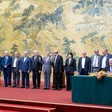The Electronic Intifada Podcast 7 May 2025
Little has been heard from the PA leadership – also the leadership of the Palestine Liberation Organization, the internationally recognized representative of the Palestinian people – throughout Israel’s ongoing genocide on the Palestinian people in Gaza, and its silence has been noted far and wide.
So irrelevant has the PA/PLO leadership become that no Palestinian official or diplomat was invited to regional summits on Gaza’s future held in Saudi Arabia and Egypt in February and April, respectively.
At home, the PA attracts only ridicule and protest – though little of this is seen after the PA banned Al Jazeera.
The PA’s security services, meanwhile, take action against its own people but never in their defense.
Deeply unpopular among Palestinians, the PA’s leadership has seemingly given up even a pretense of liberation.
Why?
“As long as they can still control the extraction of finances from the Palestinian economy, still have some sort of symbolic power within Palestinian society, the idea of popularity does not strike them as the most important element in their struggle for survival,” Abdaljawad Omar tells The Electronic Intifada in our latest podcast.
Omar, a lecturer and PhD candidate at Birzeit University, where he currently teaches in the Department of Philosophy and Cultural Studies, says the PA’s leadership survives “by waving Israel’s baton in our faces.”
“They understand their power is so completely contingent on Israel’s backing … I think they are quite comfortable being an object of people’s anger.”
But it is a state of affairs that cannot continue indefinitely. With an Israeli government publicly threatening ethnic cleansing in Gaza and the total subjugation and eventual annexation of the West Bank, and a PA with “no real strategy” other than a “policy of national suicide,” change will eventually come.
“If you think of the West Bank as the prize for the fascist settler movement, if you think of how the PA is going deeper down this trap of delegitimizing itself in the eyes of the Palestinian people, being completely beholden to aid, allowing for corruption and lack of ethics to pervade its own system,” Omar says, “this will either lead to internal violence or slowly prevent the ability of the Palestinian people to practice what they’ve always raised as the idea of sumoud [steadfastness].”
That moment hasn’t arrived yet, however. And in early May, PA leader Mahmoud Abbas formally appointed Hussein al-Sheikh, the secretary general of the Palestine Liberation Organization (PLO), as his PLO deputy, effectively anointing him heir apparent.
But heir to what? Given that Bezalel Smotrich, Israel’s finance minister, has declared 2025 the “year of sovereignty” – presumably Israel’s – over the West Bank, what is there to inherit and why would you want it?
“The sorry thing is I don’t think they care about the delivery anymore,” Omar says. “They talk the talk of a Palestinian state, but they see themselves simply as people who govern remnants, ruins; and doing it in a way that benefits them, benefits their pockets. But they are not struggling for anything.”
Produced by Tamara Nassar.
Photo by Thaer Ganaim/APA Images





Add new comment